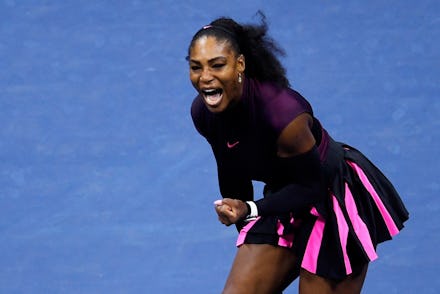Serena Williams' ESPN interview perfectly calls out sexist double standards in sports

Serena Williams has had it with the sexist double standard within the sports industry.
In an ESPN Undefeated interview that aired on Dec. 19, Williams told Grammy Award-winning artist Common that she absolutely believes that she faces an additional set of hurdles in the sports world because she is a woman. In fact, she believes that if she were a man, she would be called the world's greatest athlete many years ago.
"If I were a man, I would have 100% been considered the greatest ever a long time ago," she said.
Williams, who has won 22 Grand Slam titles, added that her identity as a woman — specifically a black woman — makes her susceptible to discrimination.
"I think being a woman is just a whole new set of problems from society that you have to deal with, as well as being black, so it's a lot to deal with — and especially lately," Williams said. "I've been able to speak up for women's rights because I think that gets lost in color, or gets lost in cultures."
Williams gave wise and motivational words for those battling their identities and body image when European beauty standards continue to dominate the mainstream. She also spoke of her own insecurities that she's had to overcome.
"There was a time when I didn't feel incredibly comfortable about my body because I felt like I was too strong," Williams added. "I had to take a second and think, 'Who says I'm too strong? This body has enabled me to be the greatest player that I can be.'"
Williams also spoke in great lengths about the insecurities black men and women face and how she was able to challenge them with the help of her father and by watching TV specials like Roots.
"A lot of black people, unfortunately, especially growing up, are discouraged, like, 'You don't look good,' or 'Your hair is not pretty' or 'Your skin's too dark,'" Williams said. "We were always told to love ourselves. My dad always said you have to know your history, and if you know your past, you can have a great future. So we always watched specials on TV."
When Common asked the four-time Olympic medalist at what point she realized she was black, Williams brought up an incident of anti-blackness she endured as a child with her sister, Venus.
"I do remember one time I was playing, and these kids came up behind me while we were practicing and — I was probably, like, 7 — they were calling me Blacky. [Both laugh.] Me and Venus, they were like, 'Blacky and Blacky.' I remember thinking, 'I don't really care' — and that's pretty crazy to think that at that age."
Nevertheless, Williams told Common she takes great pride in her identity as a black individual. She cited how black communities survived centuries of slavery, oppression and discrimination and how that perseverance inspired her to love the color of her skin.
"If you think about what the slave had to go through, and then the life that we are privileged to live — I wouldn't want to be any other color," Williams said. "There's no other race, to me, that has such a tough history for hundreds and hundreds of years, and only the strong survive, so we were the strongest and the most mentally tough, and I'm really proud to wear this color every single day of my life."